(完整版)PEP小学英语重点语法总结与分析.doc
小学PEP3-6年级英语语法总结
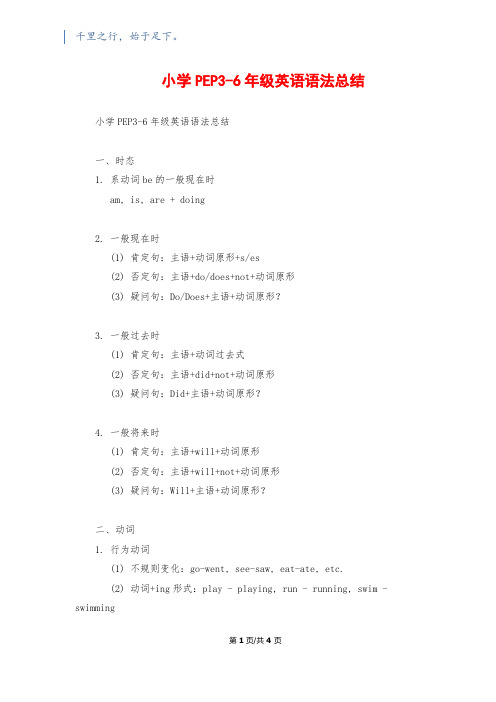
小学PEP3-6年级英语语法总结小学PEP3-6年级英语语法总结一、时态1. 系动词be的一般现在时am, is, are + doing2. 一般现在时(1) 肯定句:主语+动词原形+s/es(2) 否定句:主语+do/does+not+动词原形(3) 疑问句:Do/Does+主语+动词原形?3. 一般过去时(1) 肯定句:主语+动词过去式(2) 否定句:主语+did+not+动词原形(3) 疑问句:Did+主语+动词原形?4. 一般将来时(1) 肯定句:主语+will+动词原形(2) 否定句:主语+will+not+动词原形(3) 疑问句:Will+主语+动词原形?二、动词1. 行为动词(1) 不规则变化:go-went, see-saw, eat-ate, etc.(2) 动词+ing形式:play - playing, run - running, swim - swimming第1页/共4页2. 系动词am, is, are, was, were3. 助动词do, does, did, will三、人称代词1. 主格形式I, you, he, she, it, we, they2. 宾格形式me, you, him, her, it, us, them3. 所有格形式my/mine, your/yours, his, her/hers, its, our/ours, their/theirs四、名词1. 可数名词(1) 单数形式:car, book, pencil, etc.(2) 复数形式:cars, books, pencils, etc.2. 不可数名词water, milk, bread, etc.3. 名词所有格(1) 单数名词 + 's :Tom's book(2) 复数名词 + ' :the boys' books五、形容词1. 比较级(1) 短形容词:比较级 + than(2) 长形容词:more + 形容词原级 + than2. 最高级(1) 短形容词:the + 最高级(2) 长形容词:the most + 形容词原级六、副词1. 表示时间的副词always, usually, often, sometimes, never, etc.2. 表示程度的副词very, quite, really, too, etc.七、冠词1. 定冠词the2. 不定冠词a/an八、连词1. 并列连词and, but2. 引导时间状语从句的连词when, before, after, while, until, etc.第3页/共4页九、代词1. 主格形式I, you, he, she, it, we, they2. 宾格形式me, you, him, her, it, us, them3. 所有格形式my/mine, your/yours, his, her/hers, its, our/ours,their/theirs十、介词1. 表示位置或方向in, on, at, under, over, etc.2. 表示时间at, in, on, during, etc.3. 表示方式by, with, like, etc.以上是小学PEP(三至六年级)英语语法的总结,涵盖了主要的时态、动词、人称代词、名词、形容词、副词、冠词、连词、代词和介词等基本语法知识点。
人教版PEP小学英语语法整理总结大全

人教版(三起)小学英语语法整理总结大全第一章名词一、定义:名词是表示人或事物名称的词。
它既可以表示具体的东西,也可以是表示抽象的东西。
二、分类1. 名词可以根据意义分为普通名词和专有名词如:john is a student. student是普通名词,john是专有名词普通名词前可以用不定冠词a/an, 定冠词the 或不加冠词,专有名词前一般不加冠词,专有名词的首字母要大写。
2. 普通名词又可以分为个体名词、集体名词、物质名词和抽象名词,其中个体名词与集体名词是可数名词,物质名词和抽象名称是不可数名词。
3. 专有名词:专有名词是表示人名、地名、团体、机构、组织等的专有名词,多为独一无二的事物。
三、名词的数1、名词分为可数名词和不可数名词。
可数名词——可以数的名词不可数名词——数不清(没有复数)Drink: milk tea water orange juice coke coffee porridge Food: rice bread meat fish fruit cake dumplings2、可数名词与不定冠词a(an)连用有数数形式,不可数名词不能与不定冠词a(an)连用,没有复数形式many+可数名词复数much/a little+不可数名词some, any , a lot of (lots of) 两者都可以修饰。
3、可数名词可以直接用数词来修饰不可数名词:数词 +量词 +of + 名词对可数名词的数量提问用how many对不可数名词的数量提问用 how much4、不可数名词的量有以下两种表示方法:1) some, much ,a little ,a lot of ,a bit of , plenty of 用等表示多少。
※既可以与可数名词复数,又可以与不可数名词连用的有:plenty of ,some ,a lot of ,lots of ,most of 等。
如there is much water in the bottle .瓶中有很多水。
人教版PEP(三起)小学英语语法整理总结大全【范本模板】
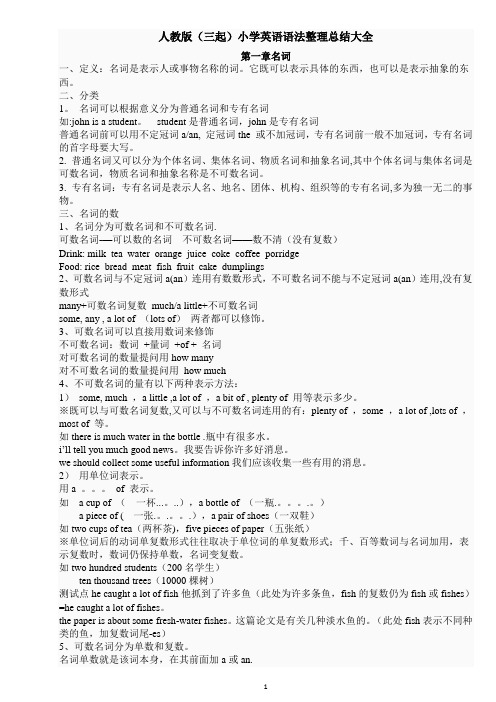
人教版(三起)小学英语语法整理总结大全第一章名词一、定义:名词是表示人或事物名称的词。
它既可以表示具体的东西,也可以是表示抽象的东西。
二、分类1。
名词可以根据意义分为普通名词和专有名词如:john is a student。
student是普通名词,john是专有名词普通名词前可以用不定冠词a/an, 定冠词the 或不加冠词,专有名词前一般不加冠词,专有名词的首字母要大写。
2. 普通名词又可以分为个体名词、集体名词、物质名词和抽象名词,其中个体名词与集体名词是可数名词,物质名词和抽象名称是不可数名词。
3. 专有名词:专有名词是表示人名、地名、团体、机构、组织等的专有名词,多为独一无二的事物。
三、名词的数1、名词分为可数名词和不可数名词.可数名词-—可以数的名词不可数名词——数不清(没有复数)Drink: milk tea water orange juice coke coffee porridgeFood: rice bread meat fish fruit cake dumplings2、可数名词与不定冠词a(an)连用有数数形式,不可数名词不能与不定冠词a(an)连用,没有复数形式many+可数名词复数 much/a little+不可数名词some, any , a lot of (lots of)两者都可以修饰。
3、可数名词可以直接用数词来修饰不可数名词:数词+量词+of + 名词对可数名词的数量提问用how many对不可数名词的数量提问用how much4、不可数名词的量有以下两种表示方法:1)some, much ,a little ,a lot of ,a bit of , plenty of 用等表示多少。
※既可以与可数名词复数,又可以与不可数名词连用的有:plenty of ,some ,a lot of ,lots of ,most of 等。
如there is much water in the bottle .瓶中有很多水。
PEP小学英语重点句型语法总结.pdf
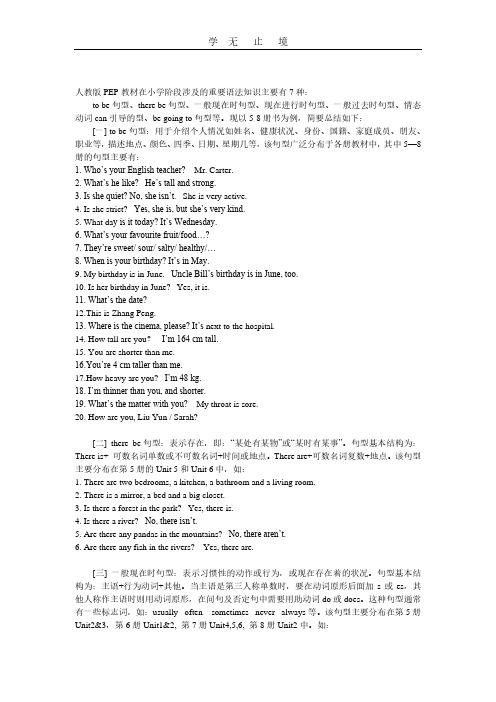
人教版PEP教材在小学阶段涉及的重要语法知识主要有7种:to be句型、there be句型、一般现在时句型、现在进行时句型、一般过去时句型、情态动词can引导的型、be going to句型等。
现以5-8册书为例,简要总结如下:[一] to be句型:用于介绍个人情况如姓名、健康状况、身份、国籍、家庭成员、朋友、职业等,描述地点、颜色、四季、日期、星期几等,该句型广泛分布于各册教材中,其中5—8册的句型主要有:1. Who’s your English teacher?Mr. Carter.2. What’s he like?He’s tall and strong.3. Is she quiet? No, she isn’t.She is very active.4. Is she strict? Yes, she is, but she’s very kind.5. What da y is it today? It’s Wednesday.6. What’s your favourite fruit/food…?7. They’re sweet/ sour/salty/ healthy/…8. When is your birthday? It’s in May.9. My birthday is in June. Uncle Bill’s birthday is in June, too.10. Is her birthday in June? Yes, it is.11. What’s the date?12.This is Zhang Peng.13. Where is the cinema, please? It’s next to the hospital.14. How tall are you?I’m 164 cm tall.15. You are shorter than me.16.You’re 4 cm taller than me.17.How heavy are you? I’m 48 kg.18. I’m thinner than you, and shorter.19. What’s the matter with you?My throat is sore.20. How are you, Liu Yun / Sarah?[二] there be句型:表示存在,即:“某处有某物”或“某时有某事”。
(全书完整版)人教版pep小学英语语法总结
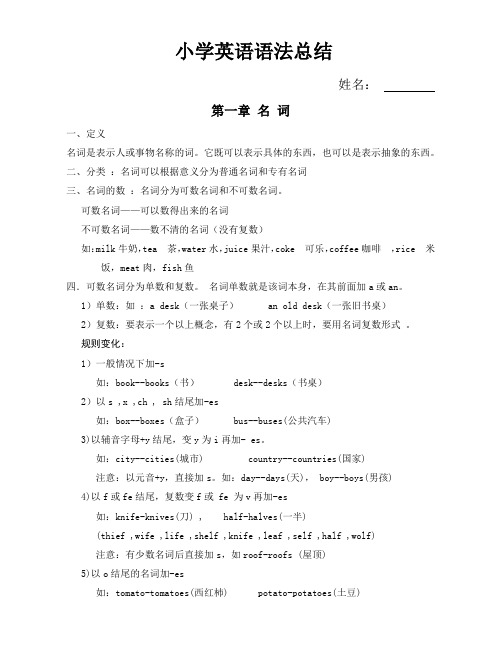
小学英语语法总结姓名:第一章名词一、定义名词是表示人或事物名称的词。
它既可以表示具体的东西,也可以是表示抽象的东西。
二、分类:名词可以根据意义分为普通名词和专有名词三、名词的数:名词分为可数名词和不可数名词。
可数名词——可以数得出来的名词不可数名词——数不清的名词(没有复数)如:milk牛奶,tea 茶,water水,juice果汁,coke 可乐,coffee咖啡,rice 米饭,meat肉,fish鱼四.可数名词分为单数和复数。
名词单数就是该词本身,在其前面加a或an。
1)单数:如:a desk(一张桌子) an old desk(一张旧书桌)2)复数:要表示一个以上概念,有2个或2个以上时,要用名词复数形式。
规则变化:1)一般情况下加-s如:book--books(书) desk--desks(书桌)2)以s ,x ,ch , sh结尾加-es如:box--boxes(盒子) bus--buses(公共汽车)3)以辅音字母+y结尾,变y为i再加- es。
如:city--cities(城市) country--countries(国家)注意:以元音+y,直接加s。
如:day--days(天), boy--boys(男孩)4)以f或fe结尾,复数变f或 fe 为v再加-es如:knife-knives(刀) , half-halves(一半)(thief ,wife ,life ,shelf ,knife ,leaf ,self ,half ,wolf) 注意:有少数名词后直接加s,如roof-roofs (屋顶)5)以o结尾的名词加-es如:tomato-tomatoes(西红杮) potato-potatoes(土豆)注意:zero 两种方式都可:zero-zeros或 zeroes(零)不规则变化1) 元音字母发变化。
如:man--men(男人) , woman--women(妇女) tooth--teeth(牙齿) ,mouse--mice(老鼠) , policeman--policemen(警察) foot--feet(脚) 2) 词尾发生变化。
小学pep-6年级英语语法总结(最全).docx
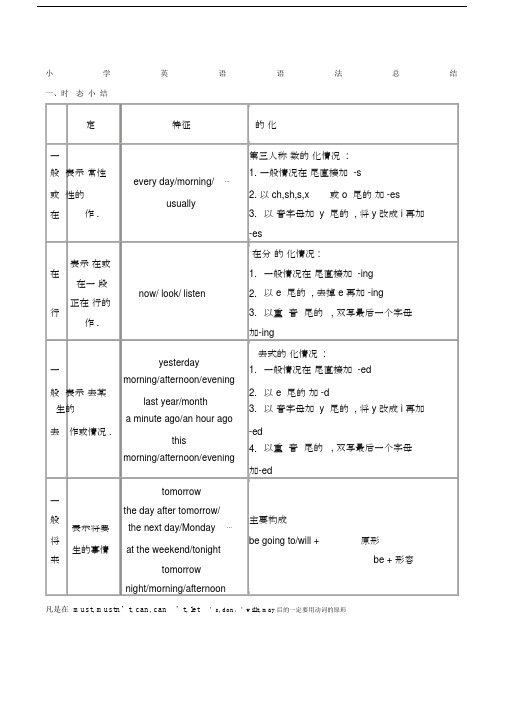
小 学 英 语 语 法 总 结一、时 态 小 结定特征的 化一第三人称 数的 化情况 :般 表示 常性every day/morning/ 1. 一般情况在 尾直接加 -s⋯或 o 尾的 加 -es或 性的 usually2. 以 ch,sh,s,x在作 . 3. 以 音字母加 y 尾的 , 将 y 改成 i 再加-es表示 在或在分 的 化情况 :在1. 一般情况在 尾直接加 -ing在一 段now/ look/ listen2. 以 e 尾的 , 去掉 e 再加 -ing正在 行的行3. 以重 音 尾的 , 双写最后一个字母 作 .加-ingyesterday去式的 化情况 :一1. 一般情况在 尾直接加 -edmorning/afternoon/evening以 e 尾的 加 -d般 表示 去某 last year/month2. 生的3. 以 音字母加 y 尾的 , 将 y 改成 i 再加作或情况 .a minute ago/an hour ago去 this-ed4. 以重 音 尾的 , 双写最后一个字母morning/afternoon/evening加-ed一 tomorrowthe day after tomorrow/般 主要构成the next day/Monday表示将要 ⋯将 生的事情at the weekend/tonight be going to/will +原形来be + 形容tomorrownight/morning/afternoon凡是在 must, mustn ’t, can, can ’t, let’s, don ,’willt, may 后的一定要用动词的原形二、名词的复数。
名词按其数 ,可分两种 : 可数名词和不可数名词.可数名词的复数变化规则:1.一般情况下 ,直接在词尾加 -s, 如:girl-girls, book-books, pen-pens2.以 s,x,sh,ch 结尾的词 ,在词后加 -es, 如 :class-classes, box-boxes, match-matches,3. 以辅音字母 +y 结尾的 ,变 y 为 i 再加 -es, 如 :city-cities, family-families, country- countries4.以 f 或 fe 结尾的 ,变 f 或 fe 为 v 再加 -es, 如 :knife-knives, wife-wives, life-lives,5.以 o 结尾的加 -es 或 -s, 如 : radio-radios, tomato-tomatoes, potato-potatoes, zoo-zoos, photo-photos,6.man-men, woman-women, foot-feet, child-children,三、形容词的比较级、最高级。
(完整word版)pep小学英语语法总结,推荐文档
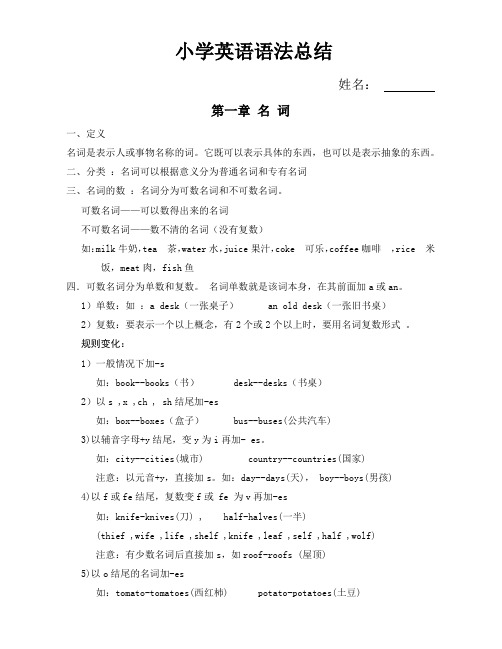
小学英语语法总结姓名:第一章名词一、定义名词是表示人或事物名称的词。
它既可以表示具体的东西,也可以是表示抽象的东西。
二、分类:名词可以根据意义分为普通名词和专有名词三、名词的数:名词分为可数名词和不可数名词。
可数名词——可以数得出来的名词不可数名词——数不清的名词(没有复数)如:milk牛奶,tea 茶,water水,juice果汁,coke 可乐,coffee咖啡,rice 米饭,meat肉,fish鱼四.可数名词分为单数和复数。
名词单数就是该词本身,在其前面加a或an。
1)单数:如:a desk(一张桌子) an old desk(一张旧书桌)2)复数:要表示一个以上概念,有2个或2个以上时,要用名词复数形式。
规则变化:1)一般情况下加-s如:book--books(书) desk--desks(书桌)2)以s ,x ,ch , sh结尾加-es如:box--boxes(盒子) bus--buses(公共汽车)3)以辅音字母+y结尾,变y为i再加- es。
如:city--cities(城市) country--countries(国家)注意:以元音+y,直接加s。
如:day--days(天), boy--boys(男孩)4)以f或fe结尾,复数变f或 fe 为v再加-es如:knife-knives(刀) , half-halves(一半)(thief ,wife ,life ,shelf ,knife ,leaf ,self ,half ,wolf) 注意:有少数名词后直接加s,如roof-roofs (屋顶)5)以o结尾的名词加-es如:tomato-tomatoes(西红杮) potato-potatoes(土豆)注意:zero 两种方式都可:zero-zeros或 zeroes(零)不规则变化1) 元音字母发变化。
如:man--men(男人) , woman--women(妇女) tooth--teeth(牙齿) ,mouse--mice(老鼠) , policeman--policemen(警察) foot--feet(脚) 2) 词尾发生变化。
PEP小学英语重点句型语法总结与分析
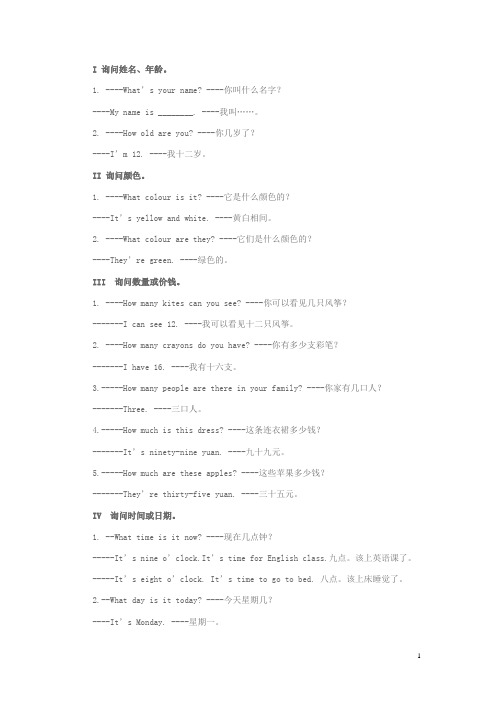
I 询问姓名、年龄。
1. ----What’s your name? ----你叫什么名字?----My name is ________. ----我叫……。
2. ----How old are you? ----你几岁了?----I’m 12. ----我十二岁。
II 询问颜色。
1. ----What colour is it? ----它是什么颜色的?----It’s yellow and white. ----黄白相间。
2. ----What colour are they? ----它们是什么颜色的?----They’re green. ----绿色的。
III 询问数量或价钱。
1. ----How many kites can you see? ----你可以看见几只风筝?-------I can see 12. ----我可以看见十二只风筝。
2. ----How many crayons do you have? ----你有多少支彩笔?-------I have 16. ----我有十六支。
3.-----How many people are there in your family? ----你家有几口人?-------Three. ----三口人。
4.-----How much is this dress? ----这条连衣裙多少钱?-------It’s ninety-nine yuan. ----九十九元。
5.-----How much are these apples? ----这些苹果多少钱?-------They’re thirty-five yuan. ----三十五元。
IV 询问时间或日期。
1. --What time is it now? ----现在几点钟?-----It’s nine o’clock.It’s time for English class.九点。
PEP小学英语重点语法(推荐文档)
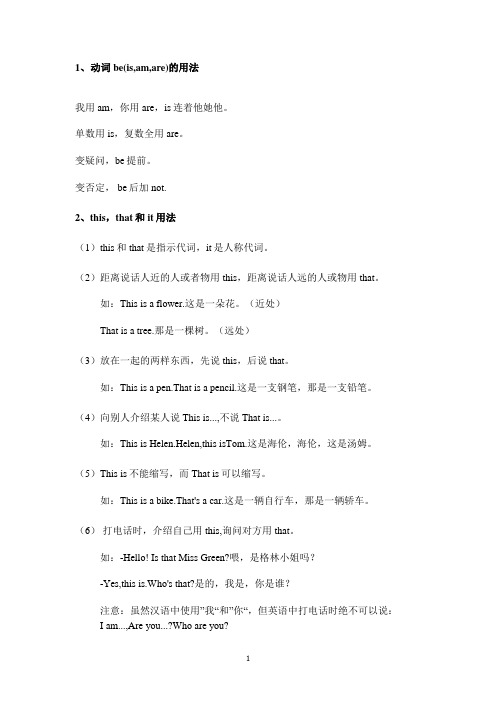
1、动词be(is,am,are)的用法我用am,你用are,is连着他她他。
单数用is,复数全用are。
变疑问,be提前。
变否定, be后加not.2、this,that和it用法(1)this和that是指示代词,it是人称代词。
(2)距离说话人近的人或者物用this,距离说话人远的人或物用that。
如:This is a flower.这是一朵花。
(近处)That is a tree.那是一棵树。
(远处)(3)放在一起的两样东西,先说this,后说that。
如:This is a pen.That is a pencil.这是一支钢笔,那是一支铅笔。
(4)向别人介绍某人说This is...,不说That is...。
如:This is Helen.Helen,this isTom.这是海伦,海伦,这是汤姆。
(5)This is不能缩写,而That is可以缩写。
如:This is a bike.That's a car.这是一辆自行车,那是一辆轿车。
(6)打电话时,介绍自己用this,询问对方用that。
如:-Hello! Is that Miss Green?喂,是格林小姐吗?-Yes,this is.Who's that?是的,我是,你是谁?注意:虽然汉语中使用”我“和”你“,但英语中打电话时绝不可以说:I am...,Are you...?Who are you?(7)在回答this或that做主语的疑问句时,要用it代替this或者that。
如:①-Is this a notebook?这是笔记本吗?-Yes,it is.是的,它是。
②-What's that?那是什么?-It's a kite.是只风筝。
3、these和those用法this, that, these和those是指示代词,these是this的复数形式,指时间,距离较近的或下面要提到的人或事;those是that的复数形式,指时间、距离较远或前面已经提到过的人或事物。
PEP新版小学英语总复习资料(精华版)
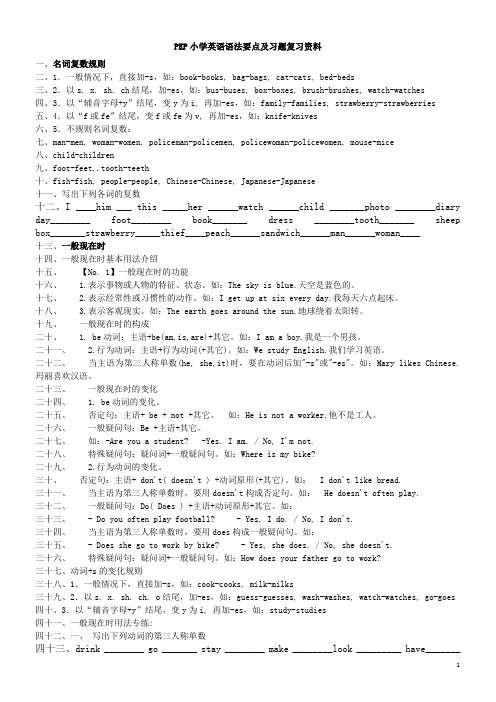
PEP小学英语语法要点及习题复习资料一、名词复数规则二、1.一般情况下,直接加-s,如:book-books, bag-bags, cat-cats, bed-beds三、2.以s. x. sh. ch结尾,加-es,如:bus-buses, box-boxes, brush-brushes, watch-watches四、3.以“辅音字母+y”结尾,变y为i, 再加-es,如:family-families, strawberry-strawberries五、4.以“f或fe”结尾,变f或fe为v, 再加-es,如:knife-knives六、5.不规则名词复数:七、man-men, woman-women, policeman-policemen, policewoman-policewomen, mouse-mice八、child-children九、foot-feet,.tooth-teeth十、fish-fish, people-people, Chinese-Chinese, Japanese-Japanese十一、写出下列各词的复数十二、I ____him ___ this _____her ______watch ______child _______photo ________diary day________ foot________ book_______ dress ________tooth_______ sheep box_______strawberry_____thief____peach______sandwich______man______woman____十三、一般现在时十四、一般现在时基本用法介绍十五、【No. 1】一般现在时的功能十六、 1.表示事物或人物的特征、状态。
如:The sky is blue.天空是蓝色的。
十七、 2.表示经常性或习惯性的动作。
小学英语(人教版PEP版)语法要点详解-六年级-小升初必备大全[1]
![小学英语(人教版PEP版)语法要点详解-六年级-小升初必备大全[1]](https://img.taocdn.com/s3/m/a2026cabf524ccbff121842d.png)
小学英语(人教版PEP版)语法要点及习题1名词复数规则1.一般情况下,直接加-s,如:book-books, bag-bags, cat-cats, bed-beds2.以s. x. sh. ch结尾,加-es,如:bus-buses, box-boxes, brush-brushes, watch-watches 3.以“辅音字母+y”结尾,变y为i, 再加-es,如:family-families, strawberry-strawberries 4.以“f或fe”结尾,变f或fe为v, 再加-es,(但有一个特例:roof→roofs)。
如:knife-knives leaf-leaves wife-wives thief-thieves wolf-wolves5.以“o”结尾的单词,如果有生命,加-es;如果没有生命,加-s。
如:①有生命:potato-potatoes tomato-tomatoes mango-mangoeshero-heroes Negro- Negroes②没生命:radio-radios piano-pianos photo-photos zoo-zoos6.不规则名词的复数变化:(一)完全不规则:man-menwoman-womenpoliceman-policemenpolicewoman-policewomenmouse-micechild-childrenfoot-feettooth-teeth(二)单数复数词形相同:fish-fish sheep-sheep deer-deerpeople-peopleChinese-ChineseJapanese-Japanese小学英语(PEP版)语法总结及习题2一般现在时一般现在时基本用法介绍【No. 1】一般现在时的功能1.表示事物或人物的特征、状态。
如:The sky is blue.天空是蓝色的。
2.表示经常性或习惯性的动作。
PEP小学英语的语法知识整理
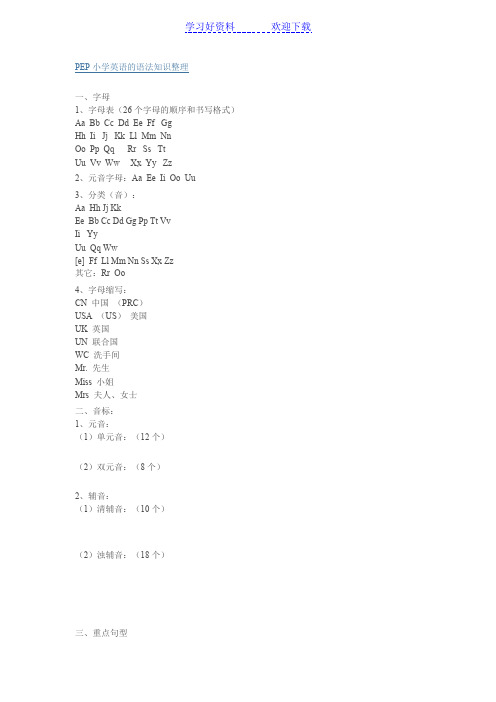
PEP小学英语的语法知识整理一、字母1、字母表(26个字母的顺序和书写格式)Aa Bb Cc Dd Ee Ff GgHh Ii Jj Kk Ll Mm NnOo Pp Qq Rr Ss TtUu Vv Ww Xx Yy Zz2、元音字母:Aa Ee Ii Oo Uu3、分类(音):Aa Hh Jj KkEe Bb Cc Dd Gg Pp Tt VvIi YyUu Qq Ww[e] Ff Ll Mm Nn Ss Xx Zz其它:Rr Oo4、字母缩写:CN 中国(PRC)USA (US)美国UK 英国UN 联合国WC 洗手间Mr. 先生Miss 小姐Mrs 夫人、女士二、音标:1、元音:(1)单元音:(12个)(2)双元音:(8个)2、辅音:(1)清辅音:(10个)(2)浊辅音:(18个)三、重点句型三年级起点的人教版PEP教材在小学阶段共有8册书,其涉及的重要语法知识主要有7种:to be句型、there be句型、一般现在时句型、现在进行时句型、一般过去时句型、情态动词can引导的句型、be going to句型等。
现以5——8册书为例,简要分析如下:[一] to be句型:用于介绍个人情况如姓名、健康状况、身份、国籍、家庭成员、朋友、职业等,描述地点、颜色、四季、日期、星期几等,该句型广泛分布于各册教材中,其中5——8册的句型主要有:1. Who’s your English teacher? Mr. Carter.2. What’s he like?He’s tall and strong.3. Is she quiet? No, she isn’t. She is very active.4. Is she strict? Yes, she is, but she’s very kind.5. What day is it today? It’s Wednesday.6. What’s your favourite fruit/food…?7. They’re sweet/ sour/ salty/ healthy/…8. When is your birthday? It’s in May.9. My birthday is in June. Uncle Bill’s birthday is in June, too.10. Is her birthday in June? Yes, it is.11. What’s the date?12.This is Zhang Peng.13. Where is the cinema, please? It’s next to the hospital.14. How tall are you?I’m 164 cm tall.15. You are shorter than me.16.You’re 4 cm taller than me.17.How heavy are you? I’m 48 kg.18. I’m thinner than you, and shorter.19. Wha t’s the matter with you? My throat is sore.20. How are you, Liu Yun / Sarah?[二] there be句型:表示存在,即:“某处有某物”或“某时有某事”。
pep小学英语语法总结
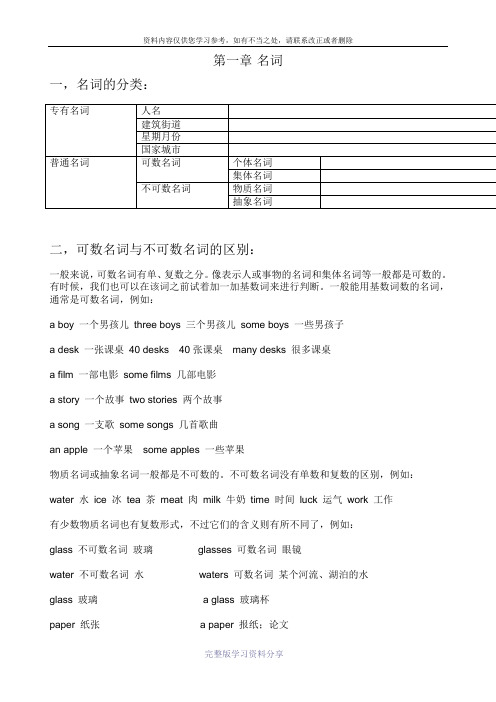
第一章名词一,名词的分类:二,可数名词与不可数名词的区别:一般来说,可数名词有单、复数之分。
像表示人或事物的名词和集体名词等一般都是可数的。
有时候,我们也可以在该词之前试着加一加基数词来进行判断。
一般能用基数词数的名词,通常是可数名词,例如:a boy 一个男孩儿three boys 三个男孩儿some boys 一些男孩子a desk 一张课桌40 desks 40张课桌many desks 很多课桌a film 一部电影some films 几部电影a story 一个故事two stories 两个故事a song 一支歌some songs 几首歌曲an apple 一个苹果some apples 一些苹果物质名词或抽象名词一般都是不可数的。
不可数名词没有单数和复数的区别,例如:water 水ice 冰tea 茶meat 肉milk 牛奶time 时间luck 运气work 工作有少数物质名词也有复数形式,不过它们的含义则有所不同了,例如:glass 不可数名词玻璃glasses 可数名词眼镜water 不可数名词水waters 可数名词某个河流、湖泊的水glass 玻璃 a glass 玻璃杯paper 纸张 a paper 报纸;论文gold 金子 a gold 金牌三、名词复数规则变化:1)一般在名词词尾加s,① map—maps地图,bird—birds鸟,orange—oranges 桔子,bike—bikes自行车;2) 以s, x, ch, sh结尾的名词加es,box—boxes盒子,class—classes班级,watch—watches手表,dish-dishes盘,碟子,餐具;3) 以O结尾的名词后面加s或es① photo—photos相片radio—radios收音机zoo—zoos动物园negro--negroes (黑人) hero--heroes (英雄)tomato—tomatoes potato—potatoes4) 以辅音字母加y结尾的名词,变y为i+es① baby—babies婴儿family—families家庭;以元音字母加y结尾的名词直接加s① boy—boys男孩toy—toys 玩具;5) 以f或fe 结尾的名词变复数时:去f或fe 加ves,如:half---halvesknife---knives leaf---leaves wolf---wolveswife---wives life---lives thief---thieves;名词复数的不规则变化:2)1)男人女人a变e,鹅足牙oo变ee,鱼鹿绵羊不用变,老鼠mouse变mice,孩子加上ren.man-- woman-- goose-- foot-- tooth--fish-- deer-- sheep-- mouse-- child--注意:与man 和woman构成的合成词,其复数形式也是-men 和-women。
(2021年整理)pep小学英语语法总结

(完整)pep小学英语语法总结编辑整理:尊敬的读者朋友们:这里是精品文档编辑中心,本文档内容是由我和我的同事精心编辑整理后发布的,发布之前我们对文中内容进行仔细校对,但是难免会有疏漏的地方,但是任然希望((完整)pep小学英语语法总结)的内容能够给您的工作和学习带来便利。
同时也真诚的希望收到您的建议和反馈,这将是我们进步的源泉,前进的动力。
本文可编辑可修改,如果觉得对您有帮助请收藏以便随时查阅,最后祝您生活愉快业绩进步,以下为(完整)pep小学英语语法总结的全部内容。
小学英语语法总结姓名:第一章名词一、定义名词是表示人或事物名称的词。
它既可以表示具体的东西,也可以是表示抽象的东西。
二、分类:名词可以根据意义分为普通名词和专有名词三、名词的数:名词分为可数名词和不可数名词。
可数名词——可以数得出来的名词不可数名词——数不清的名词(没有复数)如:milk牛奶,tea 茶,water水,juice果汁,coke 可乐,coffee咖啡,rice 米饭,meat肉,fish鱼四.可数名词分为单数和复数。
名词单数就是该词本身,在其前面加a或an.1)单数:如:a desk(一张桌子) an old desk(一张旧书桌)2)复数:要表示一个以上概念,有2个或2个以上时,要用名词复数形式。
规则变化:1)一般情况下加—s如:book--books(书) desk-—desks(书桌)2)以s ,x ,ch , sh结尾加—es如:box--boxes(盒子) bus——buses(公共汽车)3)以辅音字母+y结尾,变y为i再加- es.如:city—-cities(城市) country-—countries(国家)注意:以元音+y,直接加s。
如:day—-days(天), boy——boys(男孩)4)以f或fe结尾,复数变f或 fe 为v再加-es如:knife-knives(刀) , half—halves(一半)(thief ,wife ,life ,shelf ,knife ,leaf ,self ,half ,wolf)注意:有少数名词后直接加s,如roof—roofs (屋顶)5)以o结尾的名词加—es如:tomato-tomatoes(西红杮) potato-potatoes(土豆)注意:zero 两种方式都可:zero-zeros或 zeroes(零)不规则变化1)元音字母发变化。
Pep小学英语语法知识点汇总
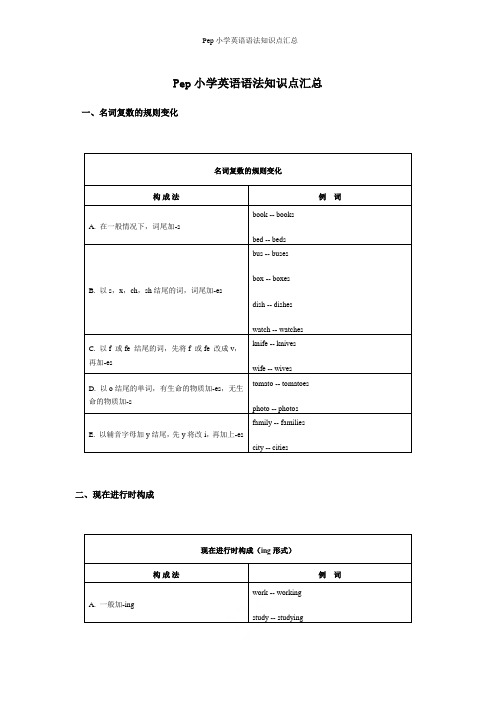
A.一般直接加-er
long -- longer
B.如果以-e结尾,直接加-r
nice -- nicer
C.闭音节词如末尾只有一个辅音字母须双写这个字母,再加-er
big -- bigger
D.以辅音字母加-y结尾的词,变y为i,再加-er
heavy -- heavier
小学阶段没有强调比较级的不规则变化
Pep小学英语语法知识点汇总
一、名词复数的规则变化
名词复数的规则变化
构成法
例词
A.在一般情况下,词尾加-s
book -- books
bed -- beds
B.以s,x,ch,sh结尾的词,词尾加-es
bus -- buses
box -- boxes
dish -- dishes
watch -- watches
have -- has
四、一般过去时
一般过去时(-ed形式)
构成法
例词
A.一般动词在词尾加-ed
cook -- cooked
play -- played
B.以e结尾的动词在词尾加-d
live -- lived
C.以辅音字母加y结尾的动词,先y变为i,再加-ed
fly -- flied
study -- studied
D.末尾只有一个辅音字母的重读闭音节词,双写该辅音字母加-ed
stop -- stopped
plan -- planned
E.不规则变化
swim -- swam
have -- had
F. be动词变化
am -- was
is -- was
are -- were
五、形容词比较级
- 1、下载文档前请自行甄别文档内容的完整性,平台不提供额外的编辑、内容补充、找答案等附加服务。
- 2、"仅部分预览"的文档,不可在线预览部分如存在完整性等问题,可反馈申请退款(可完整预览的文档不适用该条件!)。
- 3、如文档侵犯您的权益,请联系客服反馈,我们会尽快为您处理(人工客服工作时间:9:00-18:30)。
PEP 小学英重点句型法与分析三年起点的人教版PEP 教材在小学段共有8 册,其涉及的重要法知主要有7 种: to be 句型、 there be句型、一般在句型、在行句型、一般去句型、情 can 引的句型、 be going to句型等。
以5——8册例,要分析如下:[一 ] to be句型:用于介个人情况如姓名、健康状况、身份、国籍、家庭成、朋友、等,描述地点、色、四季、日期、星期几等,句型广泛分布于各册教材中,其中 5—— 8 册的句型主要有:1. Who ’ s your English teacher?Mr. Carter.2. What ’ s he like? He’ s tall and strong.3. Is she quiet? No, she isn She’t. is very active.4. Is she strict?Yes, she is, but she’ s very kind.5. What day is it today? It’ s Wednesday.6. What ’ s your favourite fruit/food⋯?7. They ’ re sweet/ sour/ salty/ healthy/⋯8. When is your birthday? It’ s in May.9. My birthday is in June. Uncle Bill ’ s birthday is in June, too.10. Is her birthday in June? Yes, it is.11. What ’ s the date?12.This is Zhang Peng.13. W here is the cinema, please? It ’nexts to the hospital.14. How tall are you ? I ’ m 164 cm tall.15. You are shorter than me.16.You ’ re 4 cm taller than me.17.How heavy are you?I ’ m 48 kg.18. I ’ m thinner than you, and shorter.19. What ’ s the matter with you? My throat is sore.20. How are you, Liu Yun / Sarah?[二 ] there be 句型:表示存在,即:“某处有某物”或“某时有某事”。
句型基本结构为: There is+ 可数名词单数或不可数名词 +时间或地点。
There are+可数名词复数+地点。
该句型主要分布在第 5 册的 Unit 5和Unit 6中,如:1.There are two bedrooms, a kitchen, abathroom and a living room.2.There is a mirror, a bed and a big closet.3. Is there a forest in the park?Yes, there is.4. Is there a river? No, there isn ’ t.5. Are there any pandas in the mountains? No, there aren ’ t.6. Are there any fish in the rivers? Yes, there are.[ 三] 一般现在时句型:表示习惯性的动作或行为,或现在存在着的状况。
句型基本结构为:主语+行为动词 +其他。
当主语是第三人称单数时,要在动词原形后面加s 或 es ,其他人称作主语时则用动词原形,在问句及否定句中需要用助动词do或does。
这种句型通常有一些标志词,如:usually often sometimes never always 等。
该句型主要分布在第 5 册Unit2&3 ,第 6 册Unit1&2, 第 7 册Unit4,5,6, 第8 册Unit2 中。
如:Book5:1.What do you have on Thursdays? We have English, math and science on Thursdays.2.What do you do on Saturdays? I watch TV on Saturdays.3.I do my homework.4.What do you have for lunch on Mondays? We have tomatoes, tofu and fish.5. I like fruit. But I don ike grapes’tl.Book6:1.When do you eat dinner? I eat dinner at 7:00in the evening.2. When do you get up? I usually get up at 12:00 noon.3.What do you do on the weekend? Usually I watch TV and go shopping.4. Sometimes I visit my grandparents. I often play football. Sometimes I go hiking.5.Which season do you like best? I like winter best.6.Why do you like summer/winter?Book7:1. How do you go to school, Sarah?2. Usually I go to school on foot.Sometimes I go by bike.3. I like collecting stamps. He likes collecting stamps, too.4. Does she teach math?Yes, she does.5. Does she teach English ?No, she doesn ’ t. She teaches math.6.What does your mother do? What does your father do?7.Where does she work? She works in a car company.She goes to work by8. How does she go to work?bus.9. Where does the rain come from?It comes from the clouds.10.Where does the cloud come from? It comes from the vapour.11. Where does the vapour come from?It comes from the water in the river.12.The sun shines and the water becomes vapour.13.How do you do that?Book8:1. My nose hurts.2. How do you feel? I feel sick. How does Amy3. You look so happy.You look sad today.[ 四] 现在进行时句型:表示说话时正在进行的动作或事件,或在短期内正在进行的动作或存在的情况。
标志词是:now 也常用在 Look! Listen! 等后面。
句型主要结构为: be 动词( am, is, are ) +动词现在分词 (v. ing) 。
该句型主要分布在第 6 册 Unit4, 5, 6 中。
如:1.What are you doing?I ’ m doing the dishes.I ’ m reading a book.2.Grandpa is writing a letter. Brother is doing homework. Mom is cooking dinner in the kitchen.3.He is writing an e-mail in the study.3. What is it doing ?It ’ s eating bananas.4. What is she doing ?She’ s jumping.5.What are they doing?They’ re swimming.They’ re climbing trees.6. Are you eating lunch?No, we aren’ t.7. Are they eating the honey?Yes, they are.8. Is he playing chess?Yes, he is.9. Is she counting insects?No, she isn’ t.[ 五] 一般过去时句型:表示过去发生的而现在已经结束的事件、动作或情况。
句型基本结构为:主语+动词过去式 + 其他。
标志词通常是:yesterday, last week , last year 等,在问句与否定句中要用助动词did 。
该句型分布在第8 册 Unit3&4中。
如:1.What did you do last weekend? I played football.2. Did you help them clean their room? Yes, I did.3.What did you do yesterday? I went fishing.4. Did you read book? Yes, I did.5. Did you clean your room? No, I didn ’ t.6.Where did you go on your holiday? I went to Xinjiang.7. What did you do there? I sang and danced withmy new friends.8. How did you go there ? I went by train.此外,一般去也可用来表示客气的。
如:Book3 Unit5, like for lunch? I Book 5 Unit3’ d like some中的:⋯What would you[六 ] 情 can 引的句型:表示有能力做某事, can后面的要用原形。
